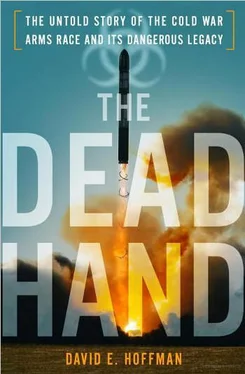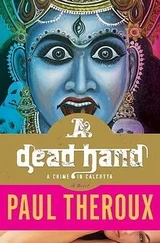From the time Gorbachev arrived in Moscow in November 1978, through the early 1980s, a simmering power struggle unfolded between an old guard, bastions of the party and military, and a handful of reformers, most of whom were academics with fresh ideas but no power base. When Brezhnev died, Andropov promoted a group of younger officials, including Gorbachev and Nikolai Ryzhkov, an experienced factory manager from Sverdlovsk. Andropov put Gorbachev in charge of economic policy for the whole country. Gorbachev solicited ideas from the academic reformers. Now, at least the reformers had an umbrella—Gorbachev would listen to them. 31
True to his background in the KGB, Andropov tried to rejuvenate the country with police-state methods, such as arresting people seen as loafers on the street during working hours. Gorbachev told him this was a dubious practice, that people were making jokes about it, but Andropov wouldn’t listen. He brushed Gorbachev off, saying, “When you get to my age, you’ll understand.”
What brought these two men together was a shared understanding of the plight of the system. Gorbachev recalled that Andropov was determined to root out the ills of the Brezhnev era, including “protectionism, in-fighting and intrigues, corruption, moral turpitude, bureaucracy, disorganization and laxity.” But as historian Robert English pointed out, it was extraordinarily hard to make change “in an ossified, militarized Party-state system,” especially given the latent power of the hard-liners. 32In the end, Andropov ran out of time. Gorbachev wrote later that Andropov could not have really carried out drastic change; the years with the KGB left him unable to break out. “He was too deeply entrenched in his own past experience; it held him firmly in its grasp,” Gorbachev said.
It fell to Gorbachev to become the agent of change, and his time was coming.
A turning point came in May 1983, when Gorbachev went to Canada for a seven-day visit as head of a parliamentary delegation. Alexander Yakovlev, the Soviet ambassador there, saw an opportunity to show Gorbachev how the West worked, and to offer his own deep concerns about the direction of the Soviet Union. In Alberta, Gorbachev was fascinated by a discussion with a wealthy farmer who had a 4,942-acre spread. Gorbachev quickly got to talking and discovered the farmer’s herd produced a milk yield of 4,700 kilograms each cow per year. The yield of Soviet cows was 2,258 kilograms. 33The farmer had two homes, cars and aluminum grain towers, and told Gorbachev he worked a long, hard year without vacations. Canada offered Gorbachev a prosperous counterpoint to Soviet agricultural failure.
The key moment of the visit was out of public view, on the evening of May 19, at the Ontario farm of Eugene Whelan, the Canadian agriculture minister. Whelan had invited Gorbachev for dinner, but was delayed in arriving. His wife, Elizabeth, greeted the Soviet guests after they drove in on a long, bumpy dirt road. Waiting around, Gorbachev and Yakovlev decided to take a private stroll, alone, in a nearby orchard. Yakovlev had been the Central Committee propaganda chief in the early 1970s, but had written an article with radical ideas for a newspaper—and was sent to diplomatic exile in Canada. He was a reformist whose enthusiasm for change only deepened as he witnessed the collapse of détente and the stagnation of the late Brezhnev years. Yakovlev, then fifty-nine years old, was angered by the over-militarization of Soviet society, and he believed markets could offer improvements to socialism. Most of all, he later recalled, he had made freedom his “religion.” In the walk in the orchard, it all spilled out.
“We had a lot of time together,” Yakovlev recalled. “So we took a long walk on that minister’s farm and, as it often happens, both of us were just kind of flooded, and let go. I somehow, for some reason, threw caution to the wind and started telling him about what I considered to be utter stupidities in the area of foreign affairs, especially about those SS-20 missiles that were being stationed in Europe and a lot of other things. And he did the same thing. We were completely frank. He frankly talked about the problems in the internal situation in Russia. He was saying that under these conditions, the conditions of dictatorship and absence of freedom, the country would simply perish. So it was at that time, during our three-hour conversation, almost as if our heads were knocked together, that we poured it all out.” 34
Two weeks later, Yakovlev was asked to return to Moscow to head up a prestigious think tank, the Institute of World Economy and International Relations, where he would become a pioneer of the new thinking.
The Kremlin paralysis under Chernenko was grave. Politburo meetings were difficult to convene. Fifteen or twenty minutes before the start time, 11 A.M., a phone call came and Gorbachev was told that Chernenko was so sick he could not attend. Would Gorbachev take the chair? This left Gorbachev little time to prepare, and it was awkward in front of the other, more senior members. By the end of 1984, “Chernenko had dropped out altogether,” Gorbachev recalled. With no one in charge, the suspicions and infighting worsened. According to Yakovlev, hard-liners launched an offensive against some of the liberal think tanks, threatening a purge that would have silenced them. 35
Gorbachev’s sense of gloom was reinforced at a December soul-searching talk with Eduard Shevardnadze, who was the first secretary of the party in the republic of Georgia, just to the south of the Stavropol region. Like Gorbachev, Shevardnadze was a high-ranking official and a man with clear vision about the country’s problems. They met at a barren park on the deserted shore near the Black Sea’s Cape Pitsunda. Strolling down a path beneath the trees, they talked openly, holding nothing back. “Everything’s rotten,” Shevardnadze said. “It has to be changed.” 36
That winter was terrible. Yegor Ligachev recalled that because of massive snows and bitter cold, industry in the country began to break down. Fifty-four of the largest electric plants were on the verge of shutdown because 22,000 freight cars carrying coal were stopped dead on the tracks, their cargo frozen solid. 37
In early December 1984, Gorbachev prepared to give a critical speech at a party conference on ideology. The Soviet elite was dejected and Gorbachev wanted to offer badly needed new ideas. Months of work had gone into refining his speech, with help from Yakovlev. The participants had already arrived in Moscow. Then Gorbachev got a call from the ailing, cautious Chernenko at 4 P.M. Alarmed at the new ideas Gorbachev planned to offer in the speech, Chernenko insisted the conference should be postponed for some vague reason about not being fully prepared. Gorbachev was indignant. The participants had already arrived! What was Chernenko thinking? “OK,” the Soviet leader backed down. “Have it, but don’t make too much noise.” In fact, Gorbachev’s December 10 address offered hints of dramatic change to come. He talked about restructuring— perestroika .
On February 24, 1985, Chernenko was shown voting on television in an election. Chernenko was seen accepting his ballot, voting, accepting flowers from a well-wisher and shaking hands. He raised his hand up to his brow and said “Good.” End of broadcast. Anatoly Chernyaev, the deputy of the International Department at the Central Committee, watched with disgust. “A man half-dead. A mummy,” Chernyaev wrote in his diary. Two days later, Chernenko was shown on television again. This time he appeared wan and held on to a chair for support as an election official handed him a document. He was wheezing. “It was a terrible show,” Chernyaev wrote. 38The only other official in the room in both broadcasts was Viktor Grishin, seventy, the Moscow party chief, a member of the Politburo’s old guard who seemed to be making a bid for power, positioning himself standing next to Chernenko. But Grishin’s move swiftly backfired. The sight of the ill Chernenko was a reminder, if one was needed, that it was time for change.
Читать дальше












